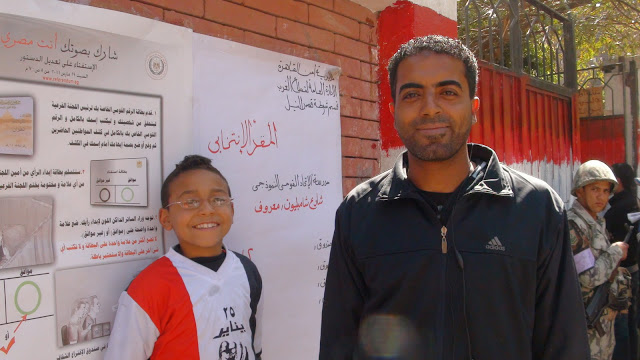Today was a Saturday on which most Egyptians did not sleep late. Already at 8am, when the polling places were opened –mostly at governmental schools– people were already patiently queuing up in order to give their –what they felt to be– historical vote. Citizens where gathering in front of these places, in correct and courteous order, until 9pm.
 |
| Uncle and nephew in front of a poster which explains the voting process, at a polling station in Cairo, on the 19th of March |
At a small elementary school of a popular area, hidden behind a mosque, near the Tahrir Square, at noon, men were patiently waiting in a long queue in the burning sun. One closely next to the other, the long line of male citizens formed all along the walls of the school yard, reached far out through the iron gate and, from there, up a small pedestrian alley in the direction of the mosque. Some of the men were reading newspapers and others making plans aloud about how to reform the country. For the ladies a separate queue was formed which was astonishingly short, compared to the one of their male compatriots. It never consisted of more than six women at a time.
An armed soldier was keeping guard in front of the iron gate of the school. And at the doors of the polling station, two police men kindly told me that I was not allowed to step further inside. A lady who stepped out to the schoolyard explained to me that there were no officers controlling inside the polling place and that one could freely take a sheet, mark “yes” or “no” and then put it into the ballot box. She showed me her thumb which was marked pink. This is the sign which makes sure that the citizens will not vote twice. However, not all of the polling stations handled this finger-coloring-policy in the same manner. Some requested the index finger and others seemed not to dye their citizens’ hands at all. This somehow made me doubt about whether it was not possible to vote twice, as all Egyptians could vote at whatever ballot box of their choice, in the complete absence of lists and with the tainted fingers as the only direct proof of participation.
Be this as it may, the Egyptian citizens were very happy and proud to be voting for the first time in a referendum in which they directly felt their influence on the shaping of a new political system. Gamal, a law student, told me that he is very pleased that in these times of democracy and freedom the Egyptians are finally asked to think and to decide what they consider good for their fatherland. He added that this is the reason why, starting from now they will be able to fully respect the law for it being passed by the sovereign people.
Next to the iron gate, a big poster hang from the wall formed out of red bricks. It explained how the voting process was to be handled by the individual citizens. Mohamed, the owner of two shops which are supplying car items, proudly explained the meaning of the poster to me, while his little nephew kept posing in front of my camera with his new T-shirt in the colors of the Egyptian flag and with the line “Revolution of the 25th of January” printed on the front.
This was the first really warm day in Cairo since the beginning of the month and people moved happily and proudly around the town, aware of the fact that they themselves had overthrown the system and were on their way to build up a new one; a real democracy, not only rhetorically defined as such by the constitution.